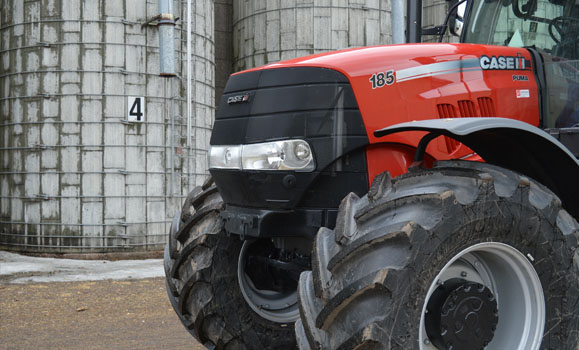It sounded too good to be true: two shiny new red tractors delivered to campus for use on the farm, no strings attached.
“It was something we always dreamed of — access to new equipment — but never thought possible,” says Jean Lynds, coordinator of the Ruminant Animal Centre in ±«Óătv’s Faculty of Agriculture.
What started five years ago as a casual agreement, with the delivery of two machines, has now become a formal partnership.
±«Óătv’s Faculty of Agriculture and CASE IH, a global leader in agricultural equipment, have entered into a new five-plus-five agreement. The Faculty will have the use of about 16 pieces of CASE IH equipment each year, for the next five years, with the commitment to renew for another five years and beyond. The leading-edge farm machinery will be used for teaching, production and research.
The partnership represents an approximate value of $1.7 million over 10 years ($170,000 per year).
A helping hand
“We are so proud and honoured to be formalizing our ongoing relationship with our friends at CASE IH through this partnership agreement,” said David Gray, dean of the Faculty of Agriculture and principal of the ±«Óătv Agricultural Campus. “Our partners at CASE IH are innovative and forward-thinking and are an essential component in the future development of our students as they enter the modern age of agriculture.”
When asked why they do it, the reason is pretty simple for CASE IH.
“It’s a simple concept: we can help the students and Faculty of Agriculture,” says Robert Meier P. Ag. of CASE IH. “You know how you get a nice warm, fuzzy feeling when you help others? We feel so good about helping the Agricultural Campus, so technically, they’re helping us.” Â
Meier also calls the partnership, the first of its kind for CASE IH in Canada, a great fit. “CASE IH is all about technology and the Agricultural Campus is the centre of excellence for agriculture in the Maritimes. It makes sense.”

(Jenna Forsyth photo)
Extending a partnership
Machines are delivered twice per year, in the spring and fall, from VanOostrum Farm Equipment Ltd, the local CASE IH dealer in Port Williams. Since 2010, the deal has resulted in the delivery of 40 pieces of equipment on the Agricultural Campus.
“We identify our needs and CASE IH meets them,” says Lynds. Not limited to tractors, CASE IH has also provided disc mowers, skid steers, utility vehicles and others. all providing students, researchers and staff access to new technology and different models.
For Gary Maddison (Class of ’83), sales manager for VanOostrum Farm Equipment, the signing of the agreement with the Faculty of Agriculture has an extra special meaning. “As an alumni, it’s a huge honour to give back to my alma mater. My two years at the AC gave me the knowledge to start my career. It feels good to return what was given to me.”
While no partnership of this type existed when Maddison was a student, he recognizes the impact it would have made. “We were repairing machines that were 20 years old. This would have given us a chance to see new equipment and certainly enhanced our experience. Agricultural technology has advanced enormously and changes so frequently. Students will now have access to the latest technology.”
Supporting the farmers of tomorrow
Students, staff and researchers aren’t the only ones who can benefit from access to such technology. Potential customers to CASE IH and VanOostrum Farm Equipment can travel a short distance to campus and see the abilities of certain machines first-hand.
“The Agricultural Campus had been tracking fuel consumption of a specific tractor,” says Meier. “We had a customer interested in the same model, but he wouldn’t accept what we told him he could get for fuel consumption.” A quick drive to the Agricultural Campus and a look at the fuel logs closed the sale.”
“The students at the AC are those farmers of tomorrow,” says Maddison. “Obviously there is some cost to this program, but it’s an investment in the future of farming in Atlantic Canada.
Now that the partnership is formalized with CASE IH the future for students, staff and researchers at ±«Óătv’s Faculty of Agriculture now looks a lot more shiny and red.
Editor's note: This article originally mistakenly identified the value of the contribution annually, when it was meant over the course of the agreement. This has now been corrected.

